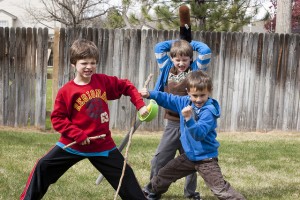
If you have boys at home, you know they’re built for battle. Whether you allow gun play or not, whether you own a TV or not, I’ll willing to bet that your boys have played some kind of war/cops-robbers/good guy-bad guy game — probably within the last 24 hours.
But not all adults are comfortable with this kind of play, and that can be a problem for boys in school, in daycare and at home.
A 2010 MSNBC article, “Bring it: Boys may benefit from aggressive play,” analyzed the research on both sides of the story and concluded that there is nothing inherently wrong with boys’ battle play. However, many teachers (and some parents) continue to believe that allowing mock battle play will somehow reinforce violent attitudes and behavior.
And, on a practical note, many teachers and parents simply find battle play harder to deal with than, say, pretend house play. In the MSNBC article, researcher Mary Ellin Logue is quoted as saying, “We don’t want to condone violence, we don’t want to risk it getting out of control…”
I can relate to that concern. As a parent, it can be extraordinarily difficult for me to let the battle play continue, especially when I see the stakes rising or a younger brother getting frustrated. As a parent, I know only all too well that the line between happy play and sobbing child is tissue-paper thin. As a parent, it sometimes seems that would it be much easier — for me — to squash the battle play all together than to deal with raised voices, swinging swords and potentially unhappy children. But is that best for my boys?
I think not, and the research agrees with me. Sophisticated play (yes, even play that includes one team holding down the fort while the other tries to break in) helps children learn delayed gratification, consideration for other’s perspectives and impulse control. It also encourages imagination and storytelling, two skills that are crucial for later success in writing. And battle play may even help children deal with their inner demons. Some researchers suggest that fighting against “the bad guys” is little boys’ way of working through their own less-than-admirable impulses. “These bad guys,” Logue is quoted as saying, “give them a way to externalize that part of them that they are trying to conquer.”
So before you rush in to break up your sons’ battles, take a breath. Watch. Listen. Observe. And when you feel your adrenaline rising, remember these words of Michael Thompson, author of Raising Cain: Protecting the Emotional Life of Boys: “Play, rougher in its themes and rougher physically, is a feature of boyhood in every society on Earth.”







5 Responses
Our rule about play…you do not play what is not permissible in real life. Why would we want our boys to pretend to do things that at 16 they would get into trouble doing? This applies to more than aggressive play, of course. And, of course, this will be different for your individual family as each family will have its own set of values that they will want to train their boys in. Otherwise, it’s be safe and have fun.
Good and evil, bad guys and good guys exist whether we admit it or not.
Healthy imaginative play is one thing, play that glorifies violence is another. That’s one thing I always tried to keep an eye on.
You and I are on the same page once again, Jennifer. And I love the book Raising Cain!
Great points! And perhaps if there are moms out there who are uncomfortable with unsupervised sword play, they could consider fencing. We are headed in to our second year of fencing. And a new sport we are going to look into this year is biathalon. A great way to combine extra energy and rifle shooting.
What an important post!
A friend earned her PhD in Sociology studying gender and race roles. She told me that all the research showed that there is only 5% of behavior that is inherently associated with gender across space, all cultures, and time. In boys that 5% was rough housing, rough play, and the like.
It’s pretty hard on a kid to be told that something they feel absolutely driven to do is wrong. It’s better to help them learn to channel it constructively, learning how to pull a punch and negotiate terms with others.
I came home from the store the other day and my 13 yrold boy was inb the back yard with a spear he had made from a PVC pip and a cut off section of a circular saw blade (and duct tape of course) and he was attacking a box- he’d throw the spear then go over and take it out and drive it into the box a few times- making some scary faces. He’s also very into the Foam Sword, LARP the boys all play. And Ki is the sweetest, most thoughtful little boy you’d want to meet!
I think-it’s not the ‘role playing’ that makes kids mean or bad- it is the parenting (or lack there of I should say). A loving, encouraging parent can make all the difference in these kids (boys) regardless of what battle games they do or don’t play.